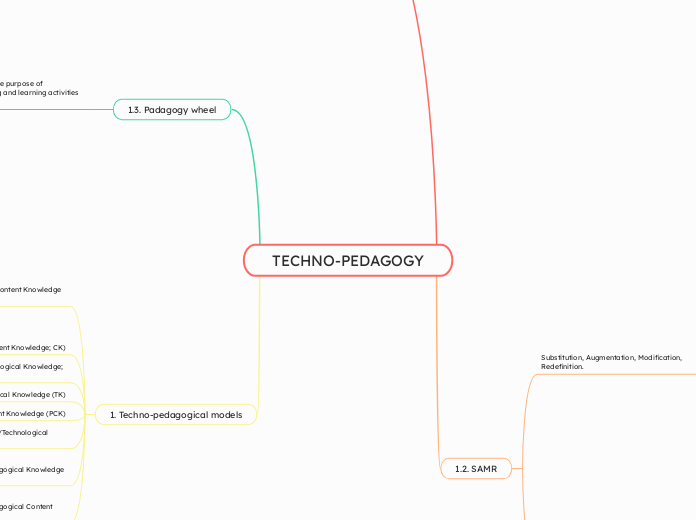TECHNO-PEDAGOGY
2. Makerspaces for Education and Training
Subtópico
1.2. SAMR
Substitution, Augmentation, Modification, Redefinition.
IMPROVE
Level 1
Sustitution
Technology is applied as a substitute for an existing one, but there is no methodological change. Creating a text with an office resource, like Google docs.
Level 2
Augmentation
Technology is applied as a substitute for another system, but there are functional improvements. Through technology and without changing methodology, learning situations are strengthened. Using an engine search engine to get information is the clearest example of this phase.
TRANSFORM
Modification
Technology allows for a significantly better redefinition of tasks. There's a methodological change based on ICT. Through simple applications, students can create new content and present information, integrating different technologies. By way of example, a student summarizes a book and uploads it to a video store (Vimeo), and their classmates comment on that contribution on a closed social network.
Redefinition
New learning environments, activities, etc. are created that improve the quality of education, and their use is necessary, since without them it would be impossible to carry out the activities of the teaching-learning process. Students create audiovisual materials as a work project and get what they've learned. For example, to launch a project, to expand it, to get funding, etc., to incorporate a social network; to collect the results of the project in a video, etc.
It allows teachers to reflect on how they incorporate or integrate educational technology into teaching-learning processes.
1.3. Padagogy wheel
Allows teachers to know the purpose of technology-based teaching and learning activities (N gie Setlhako, 2016).
1. Techno-pedagogical models
1.1 Technological Pedagogical Content Knowledge (TPCK)
A teacher must know what he teaches and how he will teach, and to do so he must combine theoretical knowledge and pedagogy (Pedagogical Content Knowledge) (Schulman, 1986).
In the Technological Pedagogical Content Knowledge model, TPCK, teachers must have deep knowledge of the contents that make up their area of knowledge, as well as pedagogical and technological knowledge (Mishra & Koehler, 2001).
Content Knowledge (Content Knowledge; CK)
Pedagogical Knowledge (Pedagogical Knowledge; PK)
Technological Knowledge (TK)
Pedagogical Content Knowledge (PCK)
Content Technology Knowledge/Technological Content Knowledge (TCK)
Pedagogical Technological Knowledge/Technological Pedagogical Knowledge (TPK)
Pedagogical Technological Knowledge/Technological Pedagogical Content Knowledge (TPACK)
